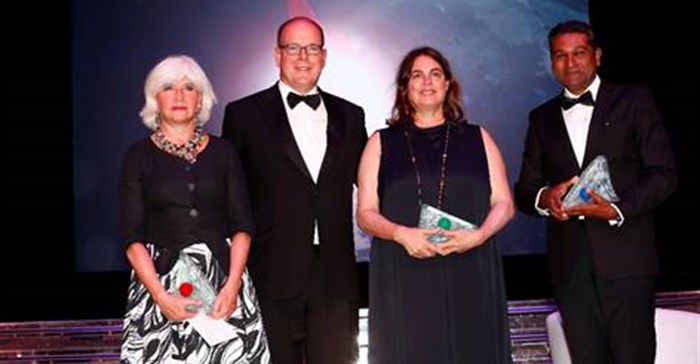Dhesigen Naidoo, CEO of the Water Research Commission (WRC), recently received the 2016 Water Award on behalf of the WRC, government and people of South Africa at the Prince Albert II of Monaco Foundation's 10th anniversary gala dinner.

Prince Albert II of Monaco and (from left to right) Laurence Tubiana, Maja Hoffman (representing Luc Hoffmann), founder and president of the LUMA Foundation and LUMA Arles et LUMA Arles, VP of the Tour du Valat Foundation, Dhesigen Naidoo of the Water Research Commission of South Africa (© FPA2)
The WRC was presented the award for its contribution for a better understanding of the environment and its outstanding work in South Africa in the field of sustainable water resource, water supply and sanitation.
Prince Albert II of Monaco handed the prize over to Naidoo at the Salle des Etoiles. The foundation was created by the prince in 2006, which is dedicated to environmental protection, sustainable development and focuses on climate change, biodiversity and water. In 2008, the foundation developed its awards program to honour key international figures and organisations for their exemplary work within its three priority domains of action. It also offers a tribute for raising awareness, supporting courageous ideas and recognising the work accomplished.
Ninth of the world’s population food insecure
Naidoo during his acceptance speech said the global deficit on access to safe water is according to UNICEF’s latest figures - 9% or 663-million people, and dignified sanitation stands at 32% or 2.4-billion people. In addition, the FAO says that in spite of our remarkable efforts in the last 20 years, still 780-million people of one ninth of the world’s population are food insecure and live in hunger. We also know that the vast majority of these folk live in Sub-Saharan Africa and South Asia. He explained that our countries have enthusiastically signed up to the Sustainable Development Goals in 2015 with the target of universal access to safe water and improved sanitation and possibly the end to hunger globally by 2030.
The WRC, together with its partners in South Africa, Africa and the World has committed itself to be the research, development and innovation partners to make this possible. Naidoo said, “We, as a globally community must use this thin end of the wedge opportunity to invest in a leap-frogging strategy, facilitating a greener, more climate friendly water and sanitation revolution. One characterised by:
- Fit-for-purpose water use encouraging reuse and recycling,
- Point of use and decentralised treatment solutions with concomitant energy production,
- Dry sanitation, and,
- Waste beneficiation.
This has the real potential of low or even no external energy input moving us collectively to a lower carbon economy. This is done with a genuine belief that what happens in sub-Saharan Africa and Asia in the next 15 years will determine the character of the global carbon economy for the rest of the 21st century. It will fundamentally determine the climate change scenario of the century and beyond. Africa is on route to become the highest populated continent by 2050, 70% of whom will be urbanites and, at least half of them will live in 50 megacities that don’t currently exist. This is an amazing greenfields opportunity.”
Naidoo expressed the WRC’s sincere gratitude for both this recognition and opportunity to share with the world what we consider a vital toolbox to ensure a greener more climate friendly, a greater biodiversity, sustainable future. He also invited the global community to the laboratory that is South Africa, Africa and the developing world, within which we can construct together the embryo of the world that we want to see for our children and the generations to come.






























